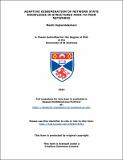Files in this item
Adaptive dissemination of network state knowledge in structured peer-to-peer networks
Item metadata
| dc.contributor.advisor | Kirby, Graham N. C. | |
| dc.contributor.advisor | Dearle, Alan | |
| dc.contributor.author | Hajiarabderkani, Masih | |
| dc.coverage.spatial | xxii, 142 p. | en_US |
| dc.date.accessioned | 2015-06-05T11:52:09Z | |
| dc.date.available | 2015-06-05T11:52:09Z | |
| dc.date.issued | 2015-06-24 | |
| dc.identifier.uri | https://hdl.handle.net/10023/6761 | |
| dc.description.abstract | One of the fundamental challenges in building Peer-to-Peer (P2P) applications is to locate resources across a dynamic set of nodes without centralised servers. Structured overlay networks solve this challenge by proving a key-based routing (KBR) layer that maps keys to nodes. The performance of KBR is strongly influenced by the dynamic and unpredictable conditions of P2P environments. To cope with such conditions a node must maintain its routing state. Routing state maintenance directly influences both lookup latency and bandwidth consumption. The more vigorously that state information is disseminated between nodes, the greater the accuracy and completeness of the routing state and the lower the lookup latency, but the more bandwidth that is consumed. Existing structured P2P overlays provide a set of configuration parameters that can be used to tune the trade-off between lookup latency and bandwidth consumption. However, the scale and complexity of the configuration space makes the overlays difficult to optimise. Further, it is increasingly difficult to design adaptive overlays that can cope with the ever increasing complexity of P2P environments. This thesis is motivated by the vision that adaptive P2P systems of tomorrow, would not only optimise their own parameters, but also generate and adapt their own design. This thesis studies the effects of using an adaptive technique to automatically adapt state dissemination cost and lookup latency in structured overlays under churn. In contrast to previous adaptive approaches, this work investigates the algorithmic adaptation of the fundamental data dissemination protocol rather than tuning the parameter values of a protocol with fixed design. This work illustrates that such a technique can be used to design parameter-free structured overlays that outperform other structured overlays with fixed design such as Chord in terms of lookup latency, bandwidth consumption and lookup correctness. A large amount of experimentation was performed, more than the space allows to report. This thesis presents a set of key findings. The full set of experiments and data is available online at: http://trombone.cs.st-andrews.ac.uk/thesis/analysis. | en_US |
| dc.language.iso | en | en_US |
| dc.publisher | University of St Andrews | |
| dc.rights | An error occurred on the license name. | * |
| dc.rights.uri | An error occurred getting the license - uri. | * |
| dc.subject | Information dissemination | en_US |
| dc.subject | Adaptive maintenance | en_US |
| dc.subject | Overlay network | en_US |
| dc.subject.lcc | TK5105.525H2 | |
| dc.subject.lcsh | Peer-to-peer architecture (Computer networks) | en_US |
| dc.subject.lcsh | Adaptive routing (Computer network management) | en_US |
| dc.title | Adaptive dissemination of network state knowledge in structured peer-to-peer networks | en_US |
| dc.type | Thesis | en_US |
| dc.contributor.sponsor | Scottish Informatics and Computer Science Alliance (SICSA) | en_US |
| dc.type.qualificationlevel | Doctoral | en_US |
| dc.type.qualificationname | PhD Doctor of Philosophy | en_US |
| dc.publisher.institution | The University of St Andrews | en_US |
This item appears in the following Collection(s)
Items in the St Andrews Research Repository are protected by copyright, with all rights reserved, unless otherwise indicated.


